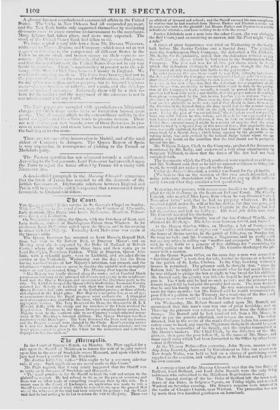Tbe Artropolls.
In the Court of Queen's Bench, on Monday. Mr. Platt applied for a rule upon the Sheriff of Middlesex to return the writ of inquiry served upon him in the case of Stockdale versus Hansard, and upon which the jury had found a verdict for Mr. Stoekdale.
Mr. Justice Littled.de said—" This ought to be a common side-bar rule, if any. Such applications are never made to this Court." Mr. Platt replied, that it very rarely happened that the Sheriff was so tardy as in the ease of Stockdale and Hansard-
" The usual practice is for the Sheriff to band the writ and return to the pia intiff on request. He bad refused to do so on the present occasion ; and there was no other mode of compelling compliance than by this rule. In a recent case in the Curt of Exchequer, an application was made to rule a Sheriff to return a writ of trial, which he refuted to do, upon the ground that one (,f the witnesses at the trial had been indicted for perjury : but the Court taid that he had nothing to do but to return the writ to the party, There was nit affidavit of demand and refusal; and the Sheriff excused his non-compliauce hy stating that he had received from Messrs. Parkes and Preston a notice not to return time writ to the plaintiff: but Afessrs. Parkes and Preston were not the defendants' attonties, and have nothing to do with the cause."
Justice Littledale sent a note into the other Court, (he was sitting in the Bail Court,) and on receiving an answer, said Mr. Platt might " take a rule."
A cause of great importance was tried on Wednesday at the Guild. hall, before Mr. Justice Erskine and a Special Jury. The pi:di:tiffs were time Southampton Doek Company, the defendant a Mr. LieharJs, Mr. Kelly, nm tho plaiatilis, stated that the defendant refused to pay the yells due on flares which 110 had teken in the Southampton Dock Company. The ilCat cell was for I. rer share, made in 1s37; which the defendant obstinatoly refused to pay, though the Act at Parliament clearly rendered him liable to the payment-
twder to prove this case there would be very little ■'.1iliculty indeed—fix
the Act und,r which the Company was incerpen,t leel very :lea duct mal ii te: cour.e of pl.:weeding in such ueitteN. :-.11 that was it-mts'ary, to pi .ve. in the iirst place, was, tint the defendant Ares a proprietor of the share, in que,tion, amounting- to fortv—which would lie done by the prodec- tion of the Company's book ; secodly, it would be proved that the cell It qm,lin had been duly male 7, and thirdly, thar the prop,-r notices tlur,of hI been given, us required by the Act, in two inpces and one cii.ci.i!ited in Southampton.-"Illese were the ti.na, points which it wes ;men- bent ii ti:e plaintiffs to make out; and if that should he done, them tio,let the direction of the learned Judge, the Jury weuld raid thr the amount sought to be r, cover.f.i. in kb was I00/. on the call, and interest thereon at hpct cent. 1,-;•!,..r the plea of "never indetted," the dell:I:dant could not pe4 have t' iv v;!ild 0,rolco to this netion a mid timoitim lie was represented by a very IC In! and cloTtent .:entleman, it was, in filet, an undefended. I;;!. m' thoFt. circumstances, it might he n matter 1)f sttrprist, that the caute Shntlid he tried by a Sp,.eial Jury at this mri,,tal tune; that singularity, lint. ever, a as easily explained, for the def,ndant had himself applied to have the cause tied by a :Special ,Tit'- ; which being. cpposed by the plaintiffs es in. volving delay, Ivas only granted by the learned Jthlge heforc whom the ap- pileation was heard, on the condition that the trial should not lie postreeed beyond this day.
Mr. William Bolger, Clerk to the Company, produced the documents mentioned by Mr. Kelly, and uuderwent a very close examination by Sergeant Talfourd, to show that the forms of the Act had not been complied with. The documents which the Clerk produced were received as evidence; and Mr. Talfourd said, that as he had no counter- evidence to bring for- ward, he would not make a speech to the Jury. Under the Judge's direction, a verdict was found for the [We believe that on the decision of this case much depended, end many refractory shareholders will be forced to pay up their calls, to carry forward what they consider a bad speculation.]


























 Previous page
Previous page